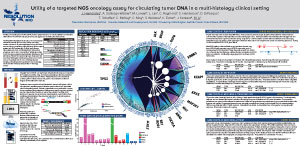
BIOPSY INEVALUABLE
75 year-old male, former light smoker, with a history of right upper lobe stage 1B NSCLC treated with lobectomy. He subsequently relapsed and was treated with thoracic radiation followed by two years of erlotinib for EGFR exon 19 deletion. On progression, pemetrexed was given but discontinued for intolerance. Patient had progressive bony metastases and poor performance status with dyspnea and hypoxia. Progressive disease in bone, not easily accessible and decay would not yield DNA for molecular testing. ctDNA assay detected EGFR T790M mutation. Osimertinib was started and the patient had a radiographic and symptomatic response. At 9 months, treatment is ongoing.
| Gene | Variant | AF | Location |
|---|---|---|---|
| EGFR | ELREA746- | 5.1% | chr7: 55242465 |
| EGFR | T790M | 0.6% | chr7: 55249071 |
| MET | Est. 5.5 copies | ||
BIOPSY REFUSED
78-year-old woman who presented 3 years ago with R acetabular fracture which required prolonged inpatient hospitalization and left her wheelchair bound. Diagnosis was made from surgical bone specimens showing TTF1 positive metastatic adenocarcinoma. Not able to test for EGFR/ALK due to need to decalcify bone specimen. Patient unsuitable for biopsy of lung lesion. Due to a minimal and remote smoking history as well as her poor performance status, she was treated with erlotinib and remained on this treatment for 2 years. The disease progressed at bony sites and paclitaxel was started with response. After 6 months of treatment, she again progressed at bony site. The patient was reluctant to undergo biopsy. ctDNA testing revealed an EGFR T790M mutation and osimertinib was started with radiographic and symptomatic response. The patient now on treatment 7+ months.
| Gene | Variant | AF | Location |
|---|---|---|---|
| EGFR | KELREA745K | 9.6% | chr7: 55242464 |
| EGFR | T790M | 7.8% | chr7: 55249071 |
| TP53 | M246V | 4.6% | chr7: 7577545 |
DENIED NGS COVERAGE, FISH FALSE NEG
47 year old male, never smoker. Stage IIIB NSCLC Adenocarcinoma. Bronchoscopic biopsies were positive for adenocarcinoma on fine-needle aspirates of the right hilum and subcarinal lymph nodes. Molecular studies demonstrated EGFR wild type and ALK and ROS1 translocation negative. Due to the strong suspicion for a driver mutation and the minimal material from bronchoscopy, mediastinoscopy was done to obtain pathologic material for NGS, which was not performed as this was denied by insurance. Testing of ctDNA detected ROS1-CD74 gene fusion.
Initial IFISH testing of the mediastinoscopy specimen showed copy loss of 5’ROS1 plus one extra copy of ROS1 in some cells, and no rearrangement of ROS1 by IFISH. When the positive result from ctDNA was communicated to pathology, additional levels were tested and ROS1 fusion was detected. Additionally, single gene NGS confirmed a ROS1- CD74 fusion. Due to delays in diagnosis, the patient was treated with carboplatin/pemetrexed chemotherapy followed by pemetrexed maintenance. He remains on therapy after 18 months. On progression or intolerance, he will be treated with crizotinib.
| Gene | Variant | AF | Location |
|---|---|---|---|
| ROS1 | ROS1-CD74 Fusion | 2.8% | chr5:149782970-chr6:117646631 |
| TP53 | I232T | 0.6% | chr7: 55249071 |
BIOPSY INELIGIBLE
75 year-old male presented with dyspnea was found to have a right upper lobe mass and multiple bony metastases. Soon after presentation the patient had hemorrhage stroke, precluding timely biopsy as the patient was not felt to be candidate for biopsy due to high risk post-stroke. ctDNA assay detected EGFR L858R and p53 mutation. The patient started on erlotinib while in outpatient rehabilitation. CT after initiation of therapy showed response and the patient responded symptomatically with decreased bony pain. Patient died 4 months later, likely from co-morbid conditions.
| Gene | Variant | AF | Location |
|---|---|---|---|
| EGFR | L858R | 8.1% | chr7: 55259515 |
| TP53 | S241F | 2.1% | chr7: 7577559 |





